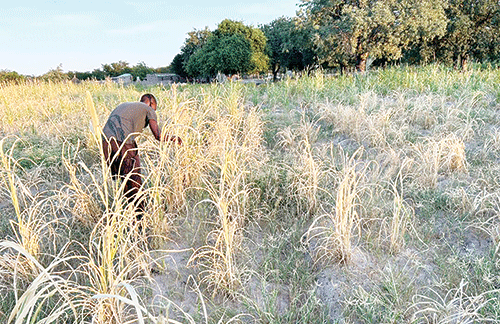udolf Gaiseb
The Namibian Meteorological Service has warned that the drought as foreseen by vice president (VP) Netumbo Nandi-Ndaitwah on Saturday could be severe. The service said the El Niño phenomenon continues to be observed over the eastern and central tropical Pacific, but has started weakening.
Meteorological technician Sieglinde Somses said El Niño, however, will heavily influence the global climate from March to May 2024.
She said there is a 60% chance that El Niño will persist from March to May, and an 80% chance of neutral conditions from April to June. “There are three phases of El Niño: the weak, the neutral and the strong phase. Currently, Namibia is faced with the strong phase of El Niño, which means less rainfall and higher temperatures,” Somses said.
She noted that for the past couple of years, Namibia has received little rainfall because of El Niño, which has resulted in a few episodes of drought that consequently resulted in food insecurity in many parts of the country. They have thus been monitoring the global El Niño phenomenon since August 2023, the beginning of the rainy season.
“It is, therefore, worrisome because El Niño has been compounding, rainfall is drying up, and if people are not cultivating crops now, they will not have food to consume after the rainy season,” Somses warned. During her speech at the Swapo central committee meeting on Saturday, Nandi-Ndaitwah urged regional coordinators and the private sector to
work collaboratively with regional governors and regional councillors to tackle the impact of the highly-anticipated drought.
“Looking at the weather conditions, it seems that this year again, we may face another devastating impact of climate change. Our country and the Southern African Development Community (SADC) region face another dry spell due to poor rainfall. A severe drought is imminent, as both commercial and communal farmers anticipate a poor harvest and grazing,” Nandi-Ndaitwah said.
As a result, some parts of the country could experience a lack of food and water, as well as a lack of grazing for the animals.
She added that regional coordinators, the private sector and the public are required to be on the lookout for whatever the government is making available to ease the impacts of the expected drought.
The VP emphasised that the management of such support must be done in the best interest of the Namibian people.
Jona Musheko, spokesperson of the Ministry of Agriculture, Water and Land Reform said the ministry cannot comment on the current projection made by the Namibia Meteorological Service, or the announcement made by the vice president.
He noted that the ministry will give a review after assessing the reality on the ground, and having received official reports from the regions. – rrgaiseb@gmail.com


